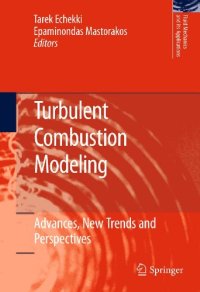
Ebook: Turbulent Combustion Modeling: Advances, New Trends and Perspectives
- Genre: Technique // Fuel Technology
- Tags: Engineering Fluid Dynamics, Fluid- and Aerodynamics, Numerical and Computational Physics, Computational Intelligence, Engineering Thermodynamics Heat and Mass Transfer
- Series: Fluid Mechanics and Its Applications 95
- Year: 2011
- Publisher: Springer Netherlands
- Edition: 1
- Language: English
- pdf
Turbulent combustion sits at the interface of two important nonlinear, multiscale phenomena: chemistry and turbulence. Its study is extremely timely in view of the need to develop new combustion technologies in order to address challenges associated with climate change, energy source uncertainty, and air pollution. Despite the fact that modeling of turbulent combustion is a subject that has been researched for a number of years, its complexity implies that key issues are still eluding, and a theoretical description that is accurate enough to make turbulent combustion models rigorous and quantitative for industrial use is still lacking.
In this book, prominent experts review most of the available approaches in modeling turbulent combustion, with particular focus on the exploding increase in computational resources that has allowed the simulation of increasingly detailed phenomena. The relevant algorithms are presented, the theoretical methods are explained, and various application examples are given.
The book is intended for a relatively broad audience, including seasoned researchers and graduate students in engineering, applied mathematics and computational science, engine designers and computational fluid dynamics (CFD) practitioners, scientists at funding agencies, and anyone wishing to understand the state-of-the-art and the future directions of this scientifically challenging and practically important field.
Turbulent combustion sits at the interface of two important nonlinear, multiscale phenomena: chemistry and turbulence. Its study is extremely timely in view of the need to develop new combustion technologies in order to address challenges associated with climate change, energy source uncertainty, and air pollution. Despite the fact that modeling of turbulent combustion is a subject that has been researched for a number of years, its complexity implies that key issues are still eluding, and a theoretical description that is accurate enough to make turbulent combustion models rigorous and quantitative for industrial use is still lacking. In this book, prominent experts review most of the available approaches in modeling turbulent combustion, with particular focus on the exploding increase in computational resources that has allowed the simulation of increasingly detailed phenomena. The relevant algorithms are presented, the theoretical methods are explained, and various application examples are given. The book is intended for a relatively broad audience, including seasoned researchers and graduate students in engineering, applied mathematics and computational science, engine designers and computational fluid dynamics (CFD) practitioners, scientists at funding agencies, and anyone wishing to understand the state-of-the-art and the future directions of this scientifically challenging and practically important field.